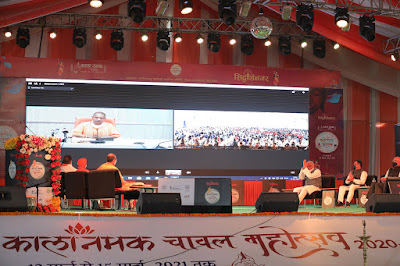Kalanamak rice variety has been chosen by the Siddharthnagar district in Uttar Pradesh, India for the “One District One Product (ODOP)” scheme under the Atmanirbhar Bharat Abhiyan campaign. This is in line with the government-level action plan aimed at improving rice productivity and better aroma retention. The rice variety also has a Geographical Indication (GI) tag for Siddharthnagar district and 10 more districts around Siddharthnagar with similar agro-climatic conditionsーGorakhpur, Deoria, Kushinagar, Maharajganj, Santkabirnagar, Basti, Bahraich, Balrampur, Gonda, and Shravasti.
The Government of Uttar Pradesh wants to promote, export, and tap the potential of Kalanamak rice variety in the Buddhist countries. The 2,600-year-old traditional variety, also referred to as the “Black Pearl” of Eastern Uttar Pradesh, is known for its relationship with Lord Buddha and Buddhism. Lord Buddha gave the seed of red husked Kalanamak to his followers with a blessing that “it will give fragrance to their lives and always remind people of me.” Hence, it is known as ‘Buddha ka Mahaprasad’ (Offering of Lord Buddha). Kalanamak has superb nutritional and aroma quality. Its milled rice is whitish in color and comes under the medium, slender grain type category, whereas its cooked rice is soft, easily digestible, and possesses a uniquely harmonious blend of taste, aroma, and delicious organoleptic properties, better elongation, and has a longer shelf life.
To popularize, promote, market, and brand the Kalanamak rice, the Government of Uttar Pradesh organized a three-day festival dubbed as Kalanamak Mahotsav on 13-15 March within the broader Kapilvastu Mahotsav in Siddharthnagar district. The International Rice Research Institute participated in the festival as a research and knowledge partner supporting the government’s efforts to popularize the Kalanamak rice under the ODOP scheme.
IRRI established an exhibition stall in the festival to display IRRI South Asia Regional Centre’s (IRRI SARC) ongoing research and products developed by the Centre for Excellence in Rice Value Addition using Kalanamak rice and to provide relevant technical information to farmers. Gluten-free cookies made from Kalanamak and Chandauli black rice flour were offered to guests who participated in the festival including the Minister of Agriculture (State), Government of India, Mr. Kailash Choudhary and Member of Parliament, Domariyaganj, Mr. Jagdambika Pal. They relayed their appreciation on the efforts of IRRI in rice value addition and product development.
 |
| IRRI’s exhibition stall in Kalanamak Mahotsav |
In the inaugural ceremony of Kalanamak Mahotsav, Shri. Yogi Adityanath, Chief Minister of Uttar Pradesh, emphasized, “Scientific and sustainable production of Kalanamak rice in the GI areas needs to be promoted and a market for it must be provided to increase the income of the farmers.” He also briefly discussed the challenges faced by the farmers in growing and marketing of Kalanamak rice and the actions taken by the Government of Uttar Pradesh to solve these challenges. He further stated the process of setting up a research facility and a common facility center will help farmers and other stakeholders to address some of these historic challenges. The Chief Minister mentioned the support expected from IRRI for Kalanamak and black rice. “IRRI strongly supported in helping Chandauli district administration in Black rice cultivation,” he added.
District Magistrate of Siddharthnagar Shri Deepak Meena, IAS brought up a possible collaboration with IRRI on research around Kalanamak rice and establishing a robust seed system, along with capacity development support in the district.
Recently, IRRI was granted with two projects, one from MSME (ODOP) to find out the best Kalanamak accession with better aroma, development of the seed system and packages and practices, and enhance the technical know-how of relevant stakeholders, and another one from Uttar Pradesh Council of Agricultural Research (UPCAR) to intensify rice-based cropping system in the Siddharthnagar district. Kalanamak Mahotsav provided opportunities for a better understanding of the variety’s growing niches and identification of farmers’ problems and appropriate solutions.
On the last day of the event, March 15, a three-hour technical session was hosted by IRRI to share research around grain quality, organic farming, zero budget natural farming, breeding, nutrient management, and scale-appropriate mechanization for the improvement of premium quality rice varieties. Dr. Sudhanshu Singh, IRRI SARC Director, gave a brief overview of the IRRI and the regional centre in Varanasi, and how IRRI SARC can help in doubling the farmers’ income. “50% of rice varieties presently under cultivation are developed by IRRI. Kalanamak, a premium rice variety, is a pride of Poorvanchal. IRRI’s global presence will boost the global market of Kalanamak in Buddhist countries,” Dr. Singh said. “IRRI SARC is also working on rice varieties with better tolerance and resilience against abiotic stresses, low glycemic index, and superior nutrient rice varieties,” he added.
 |
| IRRI’s technical session during Kalanamak Mahotsav |
Mr. Gopesh Tiwari, Head - IRRI Education, provided a glimpse of how IRRI SARC will work in close association with Acharya Narendra Deva University and the local Agriculture department to uplift the livelihood of farmers involved in the cultivation of Kalamanak rice through the proposed project under the ODOP scheme. Other speakers from IRRI include Dr. B.P. Singh, Dr. Vivek Kumar Singh, Dr. Ajay Kumar Mishra, Dr. Ashutosh Rai, Dr. Ashish Kumar Srivastava, and Dr. Ajay Kumar Mishra who gave brief presentations on various aspects of rice research including the role of farmers producer organization (FPO) to address critical issues in agriculture, findings of CERVA Lab at IRRI SARC on nutritional qualities of rice, significance of evidence-based evaluation of natural farming systems, breeding work in Kalanamak rice improvements, role of different nutrients on the improvement of grain quality traits, and mechanization and postharvest technologies.
The three-day festival was one of its kind and brought a wide range of stakeholders, policymakers, researchers, traders, exporters, government agencies, and farmers in a single platform.
###


No comments:
Post a Comment